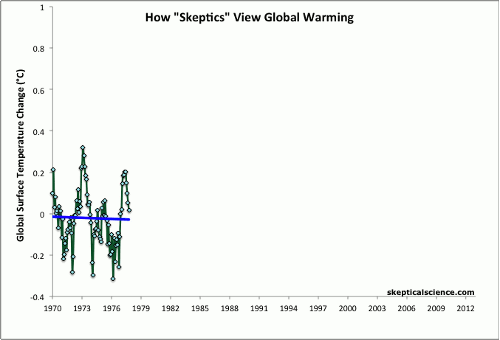That's certainly not the only problem with the way the climate change is being addressed. But there's a fundamental flaw with economic objections to acting on climate change -- they're
shortsighted. What will hurt the economy more: flooded coastal cities (meaning refugees), extensive drought, food and water shortages, more extreme weather, and foreign political instability, or raising the emissions standards for cars and industries? Many people and businesses are already feeling the negative effects of climate change. I already brought up the reinsurance industry. Here's some more examples:
Industry Awakens to Threat of Climate Change
Increased droughts, more unpredictable variability, 100-year floods every two years, said Jeffrey Seabright, Cokes vice president for environment and water resources, listing the problems that he said were also disrupting the companys supply of sugar cane and sugar beets, as well as citrus for its fruit juices. When we look at our most essential ingredients, we see those events as threats. Coke reflects a growing view among American business leaders and mainstream economists who see global warming as a force that contributes to lower gross domestic products, higher food and commodity costs, broken supply chains and increased financial risk. Their position is at striking odds with the longstanding argument, advanced by the coal industry and others, that policies to curb carbon emissions are more economically harmful than the impact of climate change."
"Nike, which has more than 700 factories in 49 countries, many in Southeast Asia, is also speaking out because of extreme weather that is disrupting its supply chain. In 2008, floods temporarily shut down four Nike factories in Thailand, and the company remains concerned about rising droughts in regions that produce cotton, which the company uses in its athletic clothes. That puts less cotton on the market, the price goes up, and you have market volatility, said Hannah Jones, the companys vice president for sustainability and innovation. Nike has already reported the impact of climate change on water supplies on its financial risk disclosure forms to the Securities and Exchange Commission."
"Although many Republicans oppose the idea of a price or tax on carbon pollution, some conservative economists endorse the idea. Among them are Arthur B. Laffer, senior economic adviser to President Ronald Reagan; the Harvard economist N. Gregory Mankiw, who was economic adviser to Mitt Romneys presidential campaign; and Douglas Holtz-Eakin, the head of the American Action Forum, a conservative think tank, and an economic adviser to the 2008 presidential campaign of Senator John McCain, the Arizona Republican.
Theres no question that if we get substantial changes in atmospheric temperatures, as all the evidence suggests, that its going to contribute to sea-level rise, Mr. Holtz-Eakin said. There will be agriculture and economic effects its inescapable. He added, Id be shocked if people supported anything other than a carbon tax thats how economists think about it.
Facing the Facts: Climate Change Is Bad For Business
"A recent study by the Carbon Disclosure Project shows that at least 70% of major businesses are concerned about the threats that climate change poses to their companies. 51% of the businesses contacted for the study said that climate change, specifically heavy rains and droughts, has already had a very large impact on operations, always in a negative way.
These arent mom and pop operations either. Massive corporations like Wal-Mart, Dell Computers, and LOreal are among those who have reported negative economic impacts from climate change related disasters. "
Climate Denial Industry Costs Us $500 Billion a Year
The International Energy Agency (IEA) has announced in its latest World Energy Outlook that every year of delayed action to address climate change will add $500 Billion to the price tag of saving the planet.

















